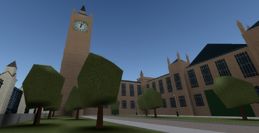Parliament: Difference between revisions
Jump to navigation
Jump to search
No edit summary |
No edit summary |
||
| Line 56: | Line 56: | ||
;[[Parliamentary opposition|Other opposition]] (5) | ;[[Parliamentary opposition|Other opposition]] (5) | ||
:{{Color box|12B6CF|border=darkgray}} [[UK First]] (5) | :{{Color box|12B6CF|border=darkgray}} [[UK First]] (5) | ||
| last_election2 = [[ | | last_election2 = [[March 2023 General Election|11 March 2023]] | ||
| next_election2 = [[Next | | next_election2 = [[Next general election|On or before 13 May 2023]] | ||
| meeting_place = [[Palace of Westminster]]<br/> | | meeting_place = [[Palace of Westminster]]<br/>[[London]]<br/>United Kingdom<br/> | ||
}} | }} | ||
'''Parliament''' is the supreme legislative body of the United Kingdom. It meets at the [[Palace of Westminster]], London. It alone possesses legislative supremacy and thereby ultimate power over all other political bodies in the UK. Parliament is bicameral but has three parts, consisting of the [[Monarchy|sovereign]], the [[House of Lords]] and the [[House of Commons]]. In theory, [[Monarchy|the Crown]] normally acts on the advice of the [[Prime Minister|prime minister]], and the powers of the House of Lords are limited to only delaying legislation; thus power is ''de facto'' vested in the House of Commons. | '''Parliament''' is the supreme legislative body of the United Kingdom. It meets at the [[Palace of Westminster]], London. It alone possesses legislative supremacy and thereby ultimate power over all other political bodies in the UK. Parliament is bicameral but has three parts, consisting of the [[Monarchy|sovereign]], the [[House of Lords]] and the [[House of Commons]]. In theory, [[Monarchy|the Crown]] normally acts on the advice of the [[Prime Minister|prime minister]], and the powers of the House of Lords are limited to only delaying legislation; thus power is ''de facto'' vested in the House of Commons. | ||
Revision as of 14:54, 23 March 2023
Parliament of the United Kingdom of Great Britain and Northern Ireland | |
|---|---|
 | |
| Type | |
| Type | Bicameral |
| Houses | House of Lords House of Commons |
| Sovereign | Monarch of the United Kingdom |
| Leadership | |
Robert since 16 October 2022 | |
TheBritishUnion since 18 March 2023 | |
| Structure | |
| Seats | House of Lords: 25 House of Commons: 50 |
 | |
House of Lords political groups |
|
 | |
House of Commons political groups |
|
| Elections | |
House of Commons last election | 11 March 2023 |
House of Commons next election | On or before 13 May 2023 |
| Meeting place | |
 | |
| Palace of Westminster London United Kingdom | |
Parliament is the supreme legislative body of the United Kingdom. It meets at the Palace of Westminster, London. It alone possesses legislative supremacy and thereby ultimate power over all other political bodies in the UK. Parliament is bicameral but has three parts, consisting of the sovereign, the House of Lords and the House of Commons. In theory, the Crown normally acts on the advice of the prime minister, and the powers of the House of Lords are limited to only delaying legislation; thus power is de facto vested in the House of Commons.